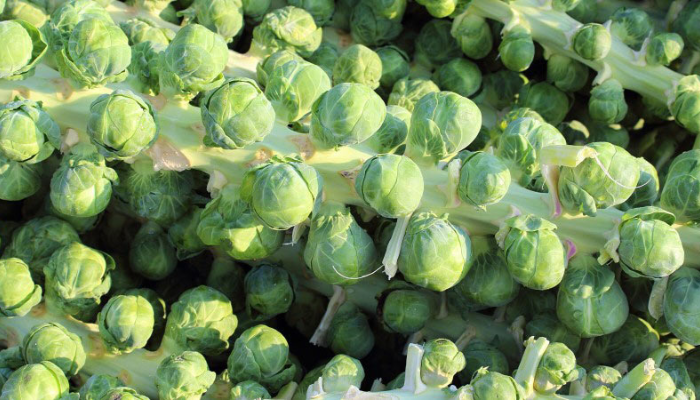21 December 2024
The story behind your Christmas Brussels Sprouts

Brussels sprouts season is in full swing. With Christmas nearing, growers are working hard to get these classic veggies onto Irish dinner plates. Love them or hate them, sprouts are a holiday staple. William Deasy, Specialised Vegetable Advisor, shares the story behind them.
Growing and harvesting
Many people are often surprised to learn that Brussels sprouts, broccoli, cabbage, cauliflower, kale and kohlrabi are all one species, Brassica oleracea. Brussels sprouts, as we know them today, can be traced back to Belgium as early as the 13th century. The “sprouts” or “buttons” that we eat are the swollen axillary buds that grow along the entire length of the main stem or stalk.
Brussels sprouts have been grown in Ireland from the early part of the last century. Nowadays, sprouts are produced from September to March, taking between 140 to 220 days to grow from transplants, with the bulk harvested during December in the weeks up to Christmas.
Harvesting sprouts is labour-intensive. In the past, each sprout was picked by hand from the stalk. These days, specialised sprout growers have invested in semi-automated harvesters with a knife system that cuts the stalks and a picking head with knives that cuts the sprouts from the stalk. The step between cutting the stalk and putting the stalk in the picking head is still done manually. In the last few years, fully automatic Brussels sprouts harvesters have been developed.
Brussels sprouts varieties on the table today are very different from the more bitter tasting ones that older people will remember. Milder, sweeter varieties have now become the industry standard, and along with new recipes, have helped drive the popularity of the vegetable. The bitter taste of Brussels sprouts comes from compounds that are an important part of the plant’s own natural defence system against insect pests and herbivores like pigeons and deer. These compounds are also responsible for many of the health-giving properties of sprouts.
Health benefits
One of the healthiest vegetables around, Brussels sprouts are low in fat, low in sodium, high in dietary fibre and free from cholesterol. They are high in vitamin C and a good source of folic acid. The cancer-fighting capabilities of sprouts, and other Brassica vegetables, are known for some years. And if all that is not enough, Brussels sprouts and other Brassicas may reduce cholesterol and the risk of heart disease.
In the kitchen
It’s no secret that some people don’t like Brussels sprouts. People with more than the average number of taste buds have a genetic over-sensitivity to sprouts and find them bitter. But the reason many people dislike sprouts is because they are all too often overcooked. If you cook them the right way, sprouts are wonderful says Darina Allen, one of Ireland’s best known cooks, whose recipe has converted many sprout haters to sprout lovers over the years.
- 450g Brussels sprouts, cut lengthways top to bottom
- 600ml water
- 1½ teaspoons salt
- 25-50g butter
- Salt and freshly ground pepper
- Serves 4-6
Trim the outer leaves if necessary and cut the sprouts in half lengthways. Salt the water and bring to a fast rolling boil. Add the sprouts, cover the saucepan just for 1 minute until the water returns to the boil, then uncover and cook for 5-6 minutes or until the sprouts are tender but still have a slight bite. Pour off the water. Melt the butter in a saucepan, roll the sprouts gently in the butter, season with lots of pepper and salt. Taste and serve immediately. Simply delicious!
Happy Christmas everyone! And please continue to support Irish produce and food.
Also Read: The story behind your Christmas ham
